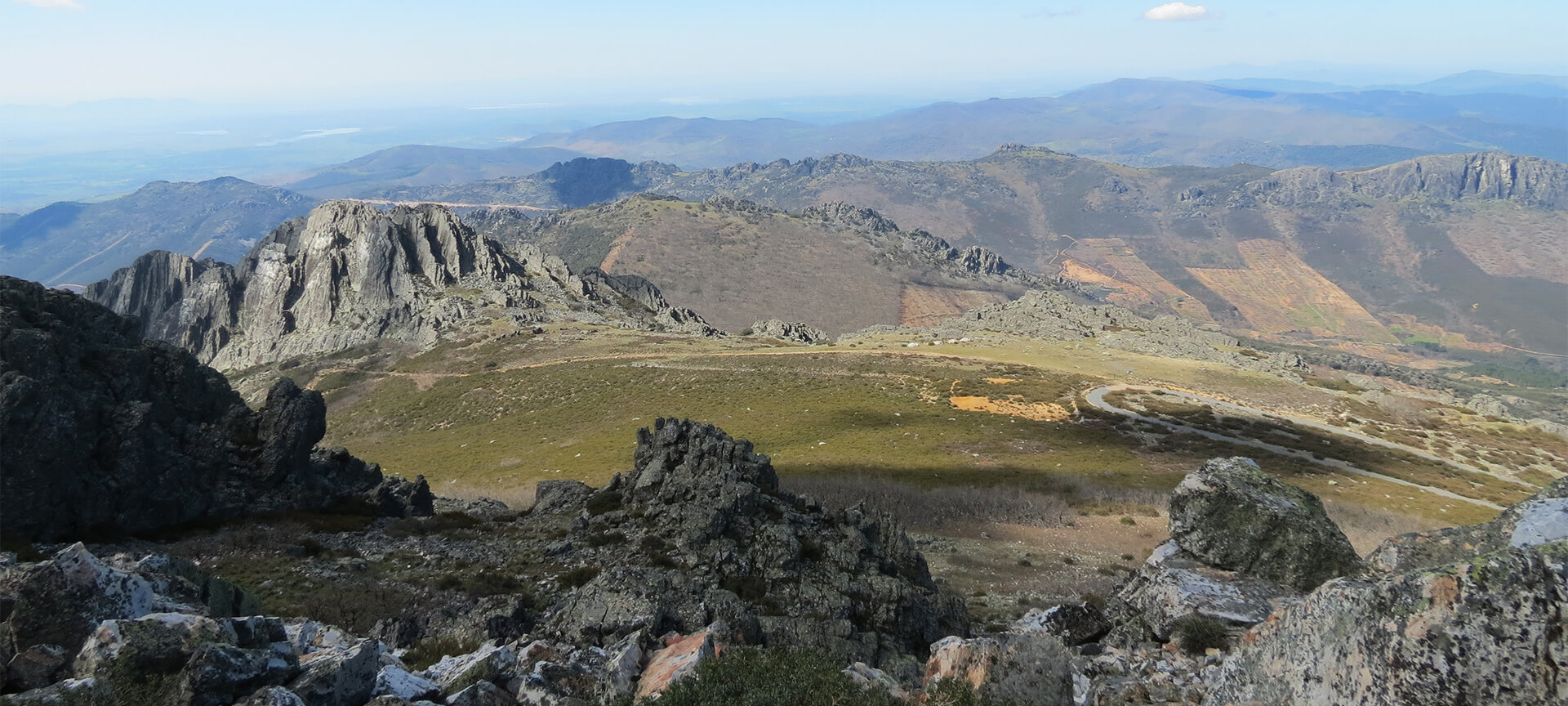
Villuercas Ibores Jara Geopark

It is located in the south of Cáceres (Extremadura), between the Tajo and Guadiana river basins. Amid landscapes of parallel mountains and valleys, its highest point is La Villuerca Peak, standing at 1,601 metres. From its summit, you get magnificent views of the mountains, valleys, characteristic “rañas” (lowland terrain), and the city of Guadalupe with its Royal Monastery. It is part of the European Network and the Global Network of Geoparks recognised by UNESCO.
The natural value of this geopark is like no other. It houses more than 50 Geosites, which stand out for their paleontological wealth (with materials dating back 560 million years), their mining history, and for hosting a Natural Monument like the Cueva de Castañar de Ibor, an underground wonder of shapes and colours.In addition to discovering fossils that lived in the sea that covered this area hundreds of millions of years ago, visitors can observe cave paintings such as those at Cueva Chiquita or Álvarez, visit old mines such as Costanaza (in Logrosán), explore a forest of enormous chestnut trees or enjoy views from lookout points such as Peña Amarilla.
Villuercas Ibores Jara Geopark
Geopark Visitor Reception Centre
Paseo de Extremadura, 6
10136 Cañamero, Cáceres (Extremadura)
Cáceres (Extremadura):
- Aldeacentenera
- Alía
- Berzocana
- Cabañas del Castillo
- Campillo de Deleitosa
- Cañamero
- Carrascalejo
- Castañar de Ibor
- Deleitosa
- Fresnedoso de Ibor
- Garvín
- Guadalupe
- Logrosán
- Navalvillar de Ibor
- Navezuelas
- Peraleda de San Román
- Robledollano
- Valdelacasa de Tajo
- Villar del Pedroso
Activa JS
What you need to know
-
Cultural information
In the area, you can find cave paintings, dolmens, hillforts, castles, and Mudejar architecture, such as that of the Monasterio de Guadalupe, which has been declared a UNESCO World Heritage site. Another monument worth highlighting is the Granja de Mirabel Palace.
-
Environmental information
Geosites are located in unique ecosystems such as the marshes, the laurel forests and the Mediterranean woods. This geopark also houses seven Special Protection Areas for Birds (“ZEPA” for the acronym in Spanish).
-
Information for visits
Visitors will find all the information they need for their tour at the various Visitor Information Centres in the area (Guadalupe Tourist Office, Visitor Centre of the ZEPA “Sierra de las Villuercas and Guadarranque Valley”, Logrosán Museum, Costanaza Mine, Visitor Centre of the Kilns of La Calera, Visitor Centre of the Castañar de Ibor Cave, Visitor Centre of the Carnival of Souls in Villar del Pedroso, El Silo Museum Centre, Visitor Centre of the Navatrasierra Fossil, Joaquín Araujo Visitor Centre and Visitor Centre of Regional Archaeology). In addition, visitors can round off their trip by sampling typical products such as “Ibores” goat cheese, “Villuercas-Ibores” honey, “Dehesa de Extremadura” Iberian products or “Ribera de Guadiana” wines.More information about access.


